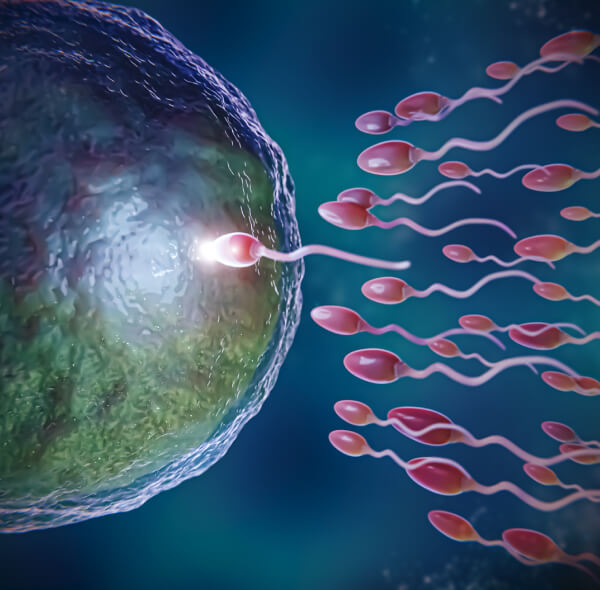
IVF Treatment
As a trusted and reputable IVF treatment center in India, we specialize in advanced and personalized IVF treatments. We empathize with the challenges that come with infertility, and our dedicated team is here to offer unwavering support throughout your journey.
For couples facing infertility, the best IVF treatment in India can be a life-changing blessing, providing a viable path to starting a family. At InviCure IVF, we comprehend the emotional and physical obstacles that accompany infertility. Rest assured, we are committed to supporting you and providing the care necessary to turn your dream of parenthood into a beautiful reality. Book an appointment at one of the best IVF treatment centre in India with high success rate.
What is IVF treatment?
In Vitro Fertilization (IVF) is an assisted reproductive technique that includes retrieving eggs from the ovaries and fertilizing them with sperm in a specialized facility. To enhance the chances of a successful pregnancy, the fertilized egg, known as an embryo, is nurtured in a controlled environment for several days before being transferred to the woman’s uterus, where it implants onto the uterine wall. This method optimizes the conditions for embryo development and increases the likelihood of achieving pregnancy. IVF in India offers individuals and couples facing fertility challenges an opportunity to conceive by harnessing the advancements in reproductive medicine and technology.
Who should go for IVF?
IVF, the most commonly known ART technique, is recommended for various situations, including:
- Fallopian tube damage or blockage: The fallopian tube, where fertilization occurs in the female anatomy, may experience damage or blockage. This can prevent the mature egg from traveling through the fallopian tube and hinder the fertilized embryo’s journey into the uterus.
- Ovulation disorders: Disorders related to ovulation can lead to the absence of a mature egg during the fertile period, resulting in no natural embryo formation and contributing to infertility.
- Endometriosis: Endometriosis is a condition in which the tissue lining the uterus grows outside it. This can negatively affect fertility by impacting the number and quality of viable eggs, as well as hindering embryo implantation.
- Uterine fibroids: Non-cancerous tumors called uterine fibroids can develop in the uterus, affecting women of childbearing age. These growths, influenced by hormonal levels, increase the risk of pregnancy loss and contribute to infertility.
- Poor egg quality: Inadequate egg quality, often associated with low ovarian reserve, can lead to failed implantation due to compromised embryo quality. This is a significant cause of infertility, especially in women over the age of 35.
- Reduced fertility with aging: As females age, particularly after 35, fertility declines due to reduced egg quality and quantity. By age 40, ovarian reserve is significantly diminished, and the chances of miscarriage rise. IVF can help mitigate health risks associated with pregnancy at an advanced maternal age by using genetically healthy embryos.
- Impaired sperm production or function: Infertility in men can result from compromised sperm quality or reduced sperm quantity, which hinders successful fertilization.
- The inability of sperm to survive in cervical mucus: Abnormal cervical mucus can impede sperm motility or cause their destruction, preventing fertilization and leading to infertility.
- Genetic diseases: Genetic diseases in either partner can be inherited by offspring. IVF cycles can be used to identify and implant genetically healthy embryos, reducing the risk of passing on inherited disorders to the child.
- Unexplained infertility: In some cases, the exact cause of infertility cannot be easily determined. IVF may be used to explore patients’ health in-depth, treat existing conditions, and proceed with the necessary procedures to address the issue.
IVF treatment procedure
The IVF treatment procedure involves several steps:
- Ovarian stimulation: The woman undergoing IVF receives hormone medications to stimulate her ovaries to produce multiple mature eggs instead of the usual one egg per menstrual cycle. This is done to increase the chances of successful fertilization.
- Egg retrieval: Once the eggs are mature, a doctor performs a minor surgical procedure to retrieve them from the woman’s ovaries. This procedure is usually performed under light sedation.
- Sperm collection: On the same day as the egg retrieval, the male partner provides a semen sample. Alternatively, sperm can be obtained from a sperm donor if needed.
- Fertilization: In the laboratory, the retrieved eggs are combined with the sperm through one of two methods: conventional IVF or Intracytoplasmic Sperm Injection (ICSI). Conventional IVF involves placing the eggs and sperm in a dish and allowing fertilization to occur naturally. ICSI involves injecting a single sperm directly into each egg.
- Embryo development: After fertilization, the eggs develop into embryos under carefully controlled laboratory conditions. The embryos are monitored for several days to ensure their proper development.
- Embryo transfer: Typically, one or more selected embryos are transferred into the woman’s uterus. This is done using a thin catheter that is gently inserted through the cervix. The process is usually painless and does not require anesthesia.
- Pregnancy test: About two weeks after the embryo transfer, a pregnancy test is conducted to determine if the procedure was successful. If the test is positive, it indicates that pregnancy has been achieved.
IVF treatment cost in India
Cost of IVF treatment in India varies, typically falling between ₹70,000 to ₹1,20,000. The actual cost of IVF treatment is influenced by factors like the number of treatment cycles, additional procedures required, the clinic’s reputation, and the geographical location. It’s important to note that health insurance might not cover the cost of IVF treatment. However, certain clinics may provide zero-cost EMI (Equated Monthly Installment) options to help individuals manage their financial burden.
Components of IVF treatment cost in india
The cost of IVF treatment in India typically encompasses the following components:
- Consultation fees: This fee covers the initial consultation with the doctor or clinic, where the couple’s medical history and fertility evaluation are discussed. The consultation fee may vary based on the doctor’s experience and reputation.
- Medication cost: The expenses for medications used during IVF can differ depending on the prescribed protocol and dosage. These medications include hormones for ovarian stimulation, egg maturation, and luteal support.
- Diagnostic tests and ultrasound scans: Various tests and scans are conducted to assess the fertility status of both partners. These infertility tests comprise blood tests, semen analysis, ultrasound scans, and other diagnostic procedures.
- Ovarian stimulation medications: This involves the use of medications to stimulate the ovaries to produce multiple eggs. The cost of ovarian stimulation medications may vary based on the specific protocol used.
- Egg retrieval: The surgical procedure to retrieve eggs from the ovaries, performed with a transvaginal ultrasound-guided needle, includes costs for anesthesia, surgeon fees, and operating room charges.
- Sperm preparation and freezing: If necessary, sperm preparation and freezing may be carried out prior to the IVF procedure. The cost for this process can vary depending on the chosen method.
- Embryo culture and development: Following fertilization of the eggs and sperm, resulting embryos are cultured in the laboratory for several days before transfer. Costs for embryo culture and development encompass laboratory charges and embryologist fees.
- Embryo transfer: This step involves transferring the fertilized embryo(s) to the woman’s uterus. The cost of embryo transfer includes expenses for anesthesia, operating room usage, and the physician’s fee.
- Cryopreservation of extra embryos: If additional embryos are present, they can be cryopreserved for future use. The cost of cryopreservation includes expenses for the process and storage.
- Pregnancy test: After the embryo transfer, a pregnancy test is conducted to confirm pregnancy. The cost of the pregnancy test is typically covered in the IVF treatment cost.
It is essential to note that the precise cost of IVF treatment in India may vary based on the specific clinic, location, and other factors. Therefore, it is advisable to inquire with the clinic about their detailed IVF treatment cost and the services included.
Is IVF treatment covered by health insurance?
Typically, health insurance policies in India do not cover the cost of IVF treatment or test tube baby procedures. IVF is considered an elective procedure rather than a medically necessary treatment, which is why it is not covered by most health insurance plans. However, there are some exceptions where certain diagnostic tests and procedures related to IVF may be covered. These may include blood tests, ultrasounds, and consultations with fertility specialists.
The extent of coverage for these diagnostic tests and procedures can vary depending on the insurance provider and the specific policy you have. Some insurance companies may offer limited coverage for these procedures, while others may not cover them at all. Additionally, certain insurance policies may have specific exclusions related to infertility or IVF treatment.
If you are planning to undergo IVF treatment and have health insurance, it is essential to contact your insurance provider to understand the scope of your coverage. You should also inquire about any co-payments or deductibles you might be responsible for paying.
In some cases, insurance providers may offer coverage for fertility treatments through a separate rider or add-on to your health insurance policy. However, these additional coverages may have limitations and exclusions, so it is crucial to carefully review the details before considering such options.
Success rate of an IVF treatment
Being the best IVF Centre in India and your reliable companion throughout your IVF journey, we aim to make IVF treatment more accessible and easier for you. The success rate of an IVF procedure is generally around 30-35%. However, for women younger than 35 years of age, the success rate increases to approximately 40%. The success of an IVF treatment depends on several key factors, including:
- Age of the female partner
- Duration of infertility
- Type of infertility
- Cause of infertility
- Quality of sperm, eggs (ova), and embryos
- Development of the endometrium (the uterine lining)
Why Choose Us?
We Receive the Best Patient’s Review.

Adeola Ogunjimi

Jessica Wong

Babatunde Okeke

Damilola Ajayi

Funmilayo Akinwande
Blogs on Infertility, IVF, IUI and More
Valuable advice and informative articles on lifestyle, fertility, and infertility for both men and women.
Get a FREE Consultation From Our Fertility Experts Today!






